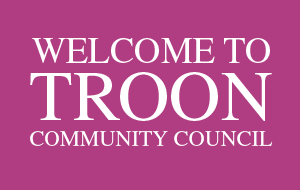The Role of the Troon Community Council
Community Information
South Ayrshire Council (A759 Kilmarnock Road @ Hillhouse Quarry, Dundonald) (Temporary Road Closure) Notice 2024
South Ayrshire Wellbeing Pledge Showcase 2024 -Friday 17th May 2024 10am – 3pm Troon Town Hall and Walker Hall
We are delighted to invite you to join us for our South Ayrshire Wellbeing Pledge Showcase 2024. read more…
Access Ayrshire Free Travel
Please see below an opportunity for free travel for Care Experienced Young People from South Ayrshire. Please share with your networks.
Riverwoods – a feature length documentary narrated by Peter Capaldi – April 23rd – Symington Community Hall -See below for info and tickets
You may have seen a recent ‘Eventbrite’ invitation email; ‘Riverwoods – a feature length documentary narrated by Peter Capaldi’, and not realised the invite was from me. read more…
ARA Road Closure – 24NM02 B749 Craigend Road & South Beach (Carriageway Resurfacing) [PUBLIC] works to take place Monday 22nd April 2024 for 4 weeks.
Please see attached the latest funding alert, along with the funding finder from Scotland’s Towns Partnership.
South Ayrshire Council (B749 South Beach, Troon) (Temporary Road Closure) Order 2024
Subject: [roadsonline.co.uk] Temporary Restriction – SAC10321 – South Ayrshire Council (B749 South Beach, Troon) (Temporary Road Closure) Order 2024 read more…
Subject: Volunteer Recruitment – Bfriend
At Bfriend we support young people throughout South Ayrshire who could benefit from social opportunities with a trusted and supportive volunteer adult befriender.
We would like to reach out to introduce the project to you, in case you are unaware of the amazing work that is carried out by our volunteer befrienders. read more…
The Open at Royal Troon – short-term lets application deadline announced !
South Ayrshire Council is reminding people that they must apply for a licence if they want to let their home during The 152nd Open at Royal Troon. read more…

